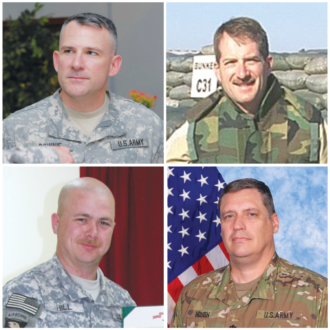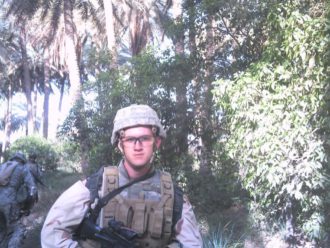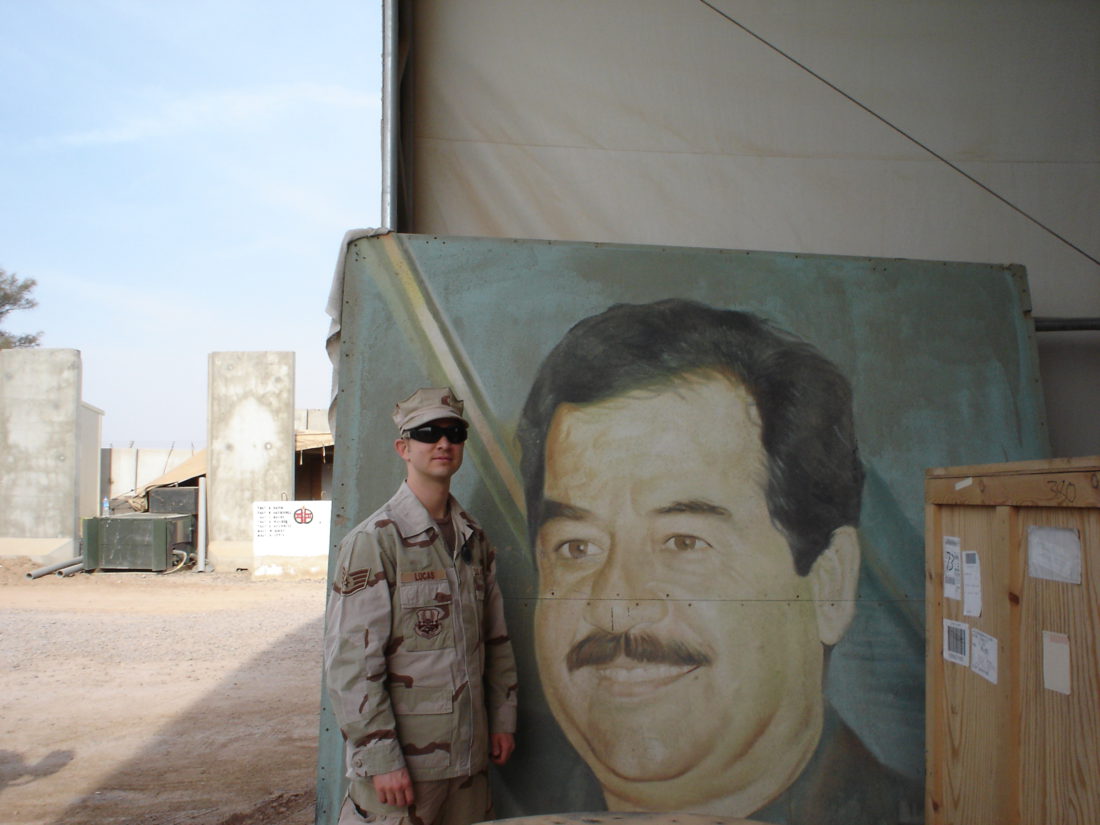Bill Manofsky of Flat Rock had a ringside seat to the start of the Iraq War. As a Navy Reserve commander, he survived missile attacks in the conflict’s earliest days in March 2003.
Waynesville’s Martin Downie arrived in the country in 2009, a time when the United States was beginning to draw down its military forces after years of protracted conflict and thousands of lives lost on both sides.
In between, Asheville’s Joe Hough, Waynesville’s Robert Lucas and Canton’s Brandon Davis served in the conflict that raged from 2003-11. Canton’s Eric Hill was deployed twice.
To mark the 20th anniversary of the start of the Iraq War, Xpress sat down with these six local veterans to reflect on their experiences, their return to civilian life and the conflict’s legacy.
As Manofsky, Downie and the others demonstrate, there is no single Iraq War experience. Some veterans served in combat and suffered life-altering injuries. Others had support roles and escaped unharmed, at least physically. Some were reservists called up for the war, others were in the midst of decadeslong military careers.
And while all say they are proud of their service in Iraq, most express complicated feelings as they look back on the war and its aftermath.
The early war
Hours after President George W. Bush announced the war had begun on March 19, 2003, Iraqi President Saddam Hussein ordered missile strikes on Kuwait, right where Manofsky was deployed. He was one of two area residents who were there right at the outset.
In fact, he had been in the country since December 2002, even before the war started to support special operations as the conflict began. “I was directly involved in the mission planning of inserting Special Forces teams into Baghdad and central Iraq, and also the Al-Faw peninsula,” he recalls.

Mandofsky was unharmed in the initial barrage but left the conflict shortly thereafter when he had an acute reaction to the anti-malaria drug, Lariam, which was issued to U.S. troops in the Middle East.
He was discharged from the Navy with a diagnosis of post-traumatic stress disorder in 2004.
Manofsky became an outspoken critic of the controversial drug, which he says initially made him severely ill, suicidal and aggressive. Long-term effects include vertigo, short-term memory loss and random tremors in his hands and legs, he says.
“The Navy does not want to talk about Lariam,” he told United Press International in 2003. “There is no mention of it in my medical record. I’m pretty upset.”
Canton’s Hill arrived in Mosul, Iraq, as an Army reservist for the Alabama-based 926th Engineer Brigade shortly after hostilities began. He had served in the Army and Reserves from 1993-01 and reenlisted after the Sept. 11, 2001, attacks.
His role with the unit put him in harm’s way routinely.
“I’m trained in communications, so I did a little bit of radio setup, but my main job [in Iraq] was to be the rear gunner in a three-Humvee convoy team,” says Hill, who now serves as pastor of Rockwood Methodist Church in Canton and Pleasant Hill United Methodist Church in Candler. “I escaped without any injuries other than my spine’s all out of whack and my neck’s all out of whack. Physically, I never got hurt.”
Between his first tour and his second tour in 2008-09, he went on more than 3,000 missions outside the line and received a Bronze Star Medal.
No easy end to the war
As the war dragged on, area veterans saw how its violence became commonplace.
“We were attacked every day while I was there, and by attacked, I mean random mortar strikes and rockets from the insurgents,” says Lucas, who was based at Balad Air Base in a noncombat role. “The first time it happened was literally when we were getting off the plane when we first arrived. That was our welcome to Iraq. The first few times it’s a little crazy. But then, you’d be surprised, you get used to it. I never felt any real sense of danger.”
Lucas was deployed to Iraq in January 2006 as part of the 727th Expeditionary Air Control Squadron, also known as “Kingpin.” By that time, Saddam had been captured and was awaiting trial, the search for weapons of mass destruction had been abandoned, and the Iraqi insurgency was well underway.
“I remember thinking, ‘OK, we’ve been here three years now, it’s about time to wrap this sh*t up,'” Lucas recalls. “It’s so funny thinking about how naive I was.”
Kingpin provided surveillance and control of aircraft over Iraqi airspace. For five months, Lucas worked nights as a tech specialist controlling the unit’s data infrastructure systems.
Davis arrived in Iraq in 2005 as part of the Army’s 4th Infantry Division. A few months into his tour, he was on patrol in Baghdad when his vehicle ran over a roadside bomb and he suffered a traumatic brain injury.
Hough went to Iraq in August 2006 as part of the 105th Engineer Group of the Army National Guard. The unit was responsible for clearing roads of improvised explosive devices, making roadway repairs and other tasks.
Then an assistant principal at A.C. Reynolds High School, he served as liaison officer between the engineer group and division headquarters. “I would advise the general officer for that division on all operations questions that would come up, as well as if I got any questions from corps level,” he recalls.
On two occasions, Hough briefed Gen. David Petraeus, commander of the Multi-National Force-Iraq.
While in Iraq, Hough was promoted from captain to major and took online courses through Western Carolina University to make progress toward his master’s degree in education. “It’s hard to believe that I could do that in a war environment, but I did,” says Hough, who is now an assistant superintendent with Buncombe County Schools. “Western Carolina did a great job, and I was able to find a little bit of time to pull away from my duties.”
Waning interest in the war
In the war’s later years, Downie witnessed the success ― and failures ― of the work to make Iraqi forces self-sustaining, opening the door to the departure of U.S. troops.
He served in Iraq from 2009-10 as the public affairs chief for Lt. Gen. Michael D. Barbero and was responsible for training, equipping and developing Iraqi security forces. Those efforts were part of newly elected President Barack Obama‘s goal of removing U.S. combat brigades from the country by August 2010.
“We needed to get their Army, their Navy — and I’m making quotes in the air when I say their ‘Navy’ — and their Air Force, as well as their police forces, in shape to defend their own country,” says Downie, who retired to Waynesville after a 30-year military career. “And man, we tried like hell, we really did. My job was to highlight all of those efforts and get as much of that into the press as possible.”
That proved to be difficult by that point in the war, he admits.
“I think most of the U.S. press had really had a belly full by that time and really wasn’t buying the sauce,” says Downie, who retired as a colonel after 30 years in the Army. “I think in the early days they were much more present on the ground. By the time I got there, we were working pretty hard to get journalists in. We’d have to embed them and take them on tours. They all wanted to be in combat.”
Coming home

For many of the veterans, the transition back to civilian life proved difficult.
Several still struggle with PTSD and depression. Some find that being in large crowds or exposed to loud noises can trigger memories of their time in Iraq.
“Even now, when I hear fireworks in my backyard, I know I’m here in Waynesville, but I still get that weird feeling of being back there again,” says Lucas, who does not suffer from PTSD.
After his Iraq tour ended in 2006, Davis spent time couch-surfing with friends in Haywood County, drinking too much and generally feeling lost outside the structure of military life. He didn’t seek help among the area’s various veterans groups.
“I wasn’t looking, and I didn’t know that anything like that existed,” he says. “I didn’t know there was a veterans community.”
He reenlisted in 2008 and spent time in Bahrain, an island nation in the Persian Gulf. After leaving the Army a second time in 2012, he worked in oil fields in North Dakota before making his way back to Western North Carolina. He got to know Brandon Wilson, director of Veterans Services of the Carolinas, who hired him as senior care coordinator.
A division of Asheville Buncombe Community Christian Ministry, the group supports veterans and their families with housing, employment and more.
Hill says that during his first tour, he had a life-altering experience that led him away from the church for six years. He chooses not to discuss the details.
He turned back to religion after coming home from his second tour and found that helped with many of the problems he was facing. But he continued to battle depression and even contemplated suicide. It was during that period that he felt the call to become a local licensed pastor and finally started seeking help.
Hill found Veterans Services of the Carolinas helpful when he finally sought support after his second tour in Iraq ended in 2009, he says. His wife, Keri Hill, now works as chaplain and intake coordinator for the group.
Other groups have proved helpful to local veterans, including Veterans Healing Farm in Hendersonville, Warrior Clan in Haywood County, Veterans Horseplay WNC of Marshall and the Western North Carolina chapter of the Military Officers Association of America.
“There are any number of organizations, commercial and nonprofit, making outreach efforts for veterans, and there’s a network out there,” Downie says. “Man, if you’re a veteran and you can’t find help, you’re not trying very hard. I’m not exaggerating.”
Several veterans praised Asheville’s Charles George VA Medical Center, which regularly ranks among the top VA hospitals in the nation for quality and has been ranked in the top five VA hospitals to work in the nation.
“Compared to the VAs in California, I like the Asheville VA a lot,” says Manofsky, who was based in the Golden State for decades before his 2017 move to Flat Rock. From 2013-16, he was heavily involved with veterans’ health issues as national vice president of legislative affairs for the Association of the U.S. Navy.
Downie and Hough believe U.S. troops returning from Iraq, Afghanistan and other recent conflicts have been treated much better by the public than those who served in Vietnam in the 1960s and ’70s.
“The lesson learned from Vietnam was regardless of how you feel about being at war, you thank the soldiers because they’re just doing their job,” Hough says. “Anytime they see somebody in a uniform, they say, ‘Thank you for your service.’ It’s almost second nature, and that’s wonderful.”
He says he and other veterans frequently have their meals paid for when eating at a restaurant. “Ask any soldier that’s deployed. If for some reason they’re out in public where they had their uniform on, it’s happened multiple times. You almost started feeling guilty because it happens so much, to be quite honest. And that’s wonderful, too.”
The war’s legacy
U.S. troops were officially withdrawn from Iraq in 2011, though the insurgency and other aspects of the armed conflict are ongoing.
Looking back at the war, many of the local veterans have conflicted feelings. They are proud of their service and the people they worked with but are uncertain whether Iraq ultimately benefited from the U.S. presence there.
“Should we have been there? I don’t know where we would be today had we not done that, but there might have been other ways to do it,” Manofsky says. “Saddam was a bad guy, just like [Russian President Vladimir] Putin‘s a bad guy. I think Bush One should have taken him out in the first Gulf War,” referring to former President George H.W. Bush and first Iraq conflict in 1990-91.
As a member of an engineering group, Hill saw firsthand areas where the U.S. improved Iraq’s schools, hospitals and roads. Outside of that, though, he doesn’t know if the country is in better shape.
Hough says Iraq was in an improved condition when the U.S. started withdrawing troops. “But I don’t know that I’ve had my hand on the pulse enough lately to know if that has continued or not.”
Downie believes the U.S. failed to learn the lessons of Vietnam about the limits of using military force to accomplish political aims.
“I know for a fact that men and women over there did their absolute level best,” Downie says. “Everyone who was there that I worked with was passionate, committed, professional. But we don’t control the strategic level; that’s in the hands of the politicians, and you can get angry about it. We continue to go into places that are fundamentally different from our culture, from our values, and we try to instill those values.”





Thanks for your your service, Fellow Veterans.
There is a shrinking number of US veterans; especially so in Asheville. But whoever you are, hang on to a healthy version of the American Dream… and not just on the Fourth.
This RS is important right now. Along with the Civil War more or less being about affirmative action and the US Constitution being about American Liberal Democracy, the US Armed Forces has a rich tradition of affirmative action.
https://www.rollingstone.com/politics/politics-features/supreme-court-affirmative-action-military-veterans-react-1234781693/